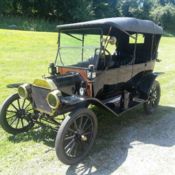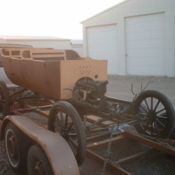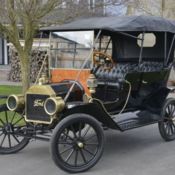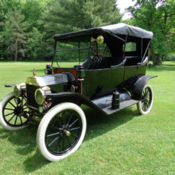Description
This listing is for what is shown in the first photo which is Photoshop combination of an unrestored original 1914 Model T Ford touring car placed inside a "Rusk Auto House". I believe this garage was marketed as a kit of steel siding. roof and trim components sometime between 1912 and 1916 or so. The first photo and the others in this listing show it as it looked before I disassembled it near Fargo North Dakota about 8 years ago. This very unusual and probably unique Model T Ford is definitely a true "survivor" and more specifically. a very rare "barn find". This car was supposedly stored away in a building and not used from 1933 onward. It still has an orange 1933 license plate on the back as you can see in the right rear view. I was told that this car had never been washed or cleaned up at all for about 80 years before I bought it so I decided to leave it exactly as I found it. To make this Model T even more appealing to a large car museum or the truly advanced collector. I decided to offer this disassembled 10 foot wide by 18 foot long "Rusk Auto House" vintage garage kit together with this one of a kind Model T Ford. This very early single stall automobile garage can be used to display this car authentically with some real class. Several photos of this garage and one of a period ad are shown near the last photos of this listing. This garage was first offered in 1912 as a kit by the Fargo Cornice & Ornament Company of Fargo North Dakota. As you can see. the frame is of wood 2 x 4 construction while the roof. nbsp;all of the siding and both of the double doors are covered with embossed steel panels. The roof panels are actually embossed and made to look like a tile roof. Please notice the stamped steel ornamentation painted gray and located above the double doors. Some of these garages also said "Rusk Auto House" there as well. A friend found this very rare and interesting period garage here on eBay about 8 years ago. I bought this true "survivor" garage near Fargo North Dakota back then. made a trip to Fargo. nbsp;photographed it. very carefully disassembled it. brought it back to Montana and stored all of the parts in my building. I can just imagine how this very special garage would look reassembled in the corner of a museum with both doors nearly open. The doors would be open just far enough so that one could clearly see the front of this very special Model T Ford resting peacefully inside. This garage can be used to make the "Rip VanWinkle" part of the history of this Model T really come to life for anyone who is fortunate enough to view a display such as this. I bought this car sight unseen from a friend several years ago. As I was driving to pick it up. I checked my email one morning and read the daily site from "Hemmings Daily". I try to do that every day because it usually has some information that interests me. There was an article there that mentioned how a collector in the Midwest had recently purchased a 1957 Corvette that had been stored away on a trailer in a building for over 30 years. The car was obviously dirty from that length of storage so the new owner decided to leave it dirty and on the trailer and call it his "barn find". I decided then that if that was the proper fate for his Corvette. then perhaps I should also leave this car just and I found it. I decided then to never make this car run and drive again or even clean it up at all. How many 101 year old "survivor" or "barn find" automobiles have you ever seen? The title for this car references the number 519. 52 that is on the brass dash tag that came with this car. That brass dash tag was laying loose with two of the original attaching nails on the front seat cushion when I pickup up this car. The previous owner probably removed the tag and took it to the DMV when they applied for the title that I received with this car. The engine serial number is 553. 87 and according to Bruce McCalley's fantastic book titled "Model T Ford - The Car That Changed The World". that engine was assembled on August 6. 914. The first character in the engine block casting date is not readable so the casting date effectively becomes ? 4 14 suggesting that that block may have been cast on August 4. 1914. If that is the case. the block was cast 2 days before the engine was finished and stamped with a serial number. The dash serial number tag for this car is numbered 33. 35 numbers lower than the engine number. If anyone out there is an expert at correlating the engine and serial tag numbers for these early brass T's. please get in touch with me. I have a very nice original and relatively low mile 1914 Model T Ford roadster in my collection that is not for sale at this time. It has the number 558. 73 stamped on the brass tag on the right side of the dash board. That car has the number 592. 84 stamped on the engine number pad. According to McCauley's book. that engine was finished and stamped on October 1. 1914. That engine block was cast on 9 28 14 which was only 3 days before it was finished and stamped with the serial number. The dash serial number tag is numbered 33. 11 numbers lower than the engine number. It is very interesting to me that both of these assumed to be original T's have engine numbers 33. 00 to 34. 00 numbers higher than the numbers on the vehicle serial number tags. Please help explain this if you possibly can. Both of my 1914 T's have the steel crank handle rather than the earlier aluminum crank handle. That is what one might expect with cars built late in the 1914 model year. This "barn find" touring has the earlier cast brass quadrant at the top of the steering column where my roadster that was assembled about 2 months later has the later style of stamped steel quadrant at the top of the steering column. Please do not be frustrated because I listed this gem with a reserve. I do that so that I don't have to spend 10 days worrying about giving my car away or bother a friend to shill bid on it or buy it back for me at the end of the auction as some sellers do. This is not something a member of my family left to me that I have on here to get a cheap appraisal. I make most of my living buying and selling collectible cars. trucks. nbsp;tractors. toys. signs and other items so this is here to find a new home. I listed a very solid 1967 Pontiac LeMans convertible that was missing an engine and transmission here on eBay about 5 years ago. I figured any A-body GM convertible of that vintage would not need a reserve. My car sold for $2. 00 to a collector in New York who wanted the body to fix his rusty 1967 GTO convertible. He was absolutely elated to win that auction and told me that he placed a $7. 00 proxy bid on my car in an attempt to make sure he would win it. It really hurt to find out that I left over $5. 00 on the table on that deal so that is part of the reason I generally use a reserve on my vehicle listings here. If this vehicle does not meet my very realistic reserve and you are serious about owning it. please do not be afraid to contact me so we can work out a deal on it. I can make you a "Second Chance Offer" here through eBay so we can make it happen. This car is in exceptional original condition because it most likely has not been messed with since it was last registered in 1933. The obvious accessories or modifications that I am aware of would include the Prestolite acetylene tank on the left running board that replaced the carbide generator. the later Model T Ford magneto driven horn with a switch mounted on the steering column. nbsp;a speedometer and the tan canvas seat and door covers. Those seat covers were most likely installed back in 1914 by the dealer that sold this treasure new. Those covers no doubt protected the upholstery through the years but are now in tough shape for the most part as you can see in these photos. The 4 ignition coils look good but they are newer than the brass top or copper top coils that supposedly came in this car from the factory. I have not removed the coils and do not intend to. The coil box lid is correct and has quite a layer of 80 year old dust on the top of it. The rubber mat on the front floor is from a later Model T that has the tapered front toe board. I am not sure what is on the floor in the rear seat area. There is a significant amount of dust on the folded top assembly indicating that it may have been down for many years. Whoever folded it down did not do it correctly but I decided to leave it just as it I received it a few years ago. I can find no rusted out sheet metal anywhere in this body or the running boards or fenders. The wood all appears to be good when looking up from the bottom of the car or opening and closing the 3 doors. The paint is flaking off of the body so I have been very careful to not bother it at all. The rear fenders are quite good but the front fenders have some minor damage on the edges as you can see in the photos. I am sorry that my photos here are not better but it is cold here now and I would have to move 5 dead vehicles to get this car outside in the day light. The first two photos of this listing were taken the day I picked this car up and the condition of the car has not changed since then. The treads on the tires are hard and were falling off the day I picked this car up some years ago. After I got this car home inside an enclosed trailer. nbsp;I found a dolly to put under the rear axle and used a floor jack under the front axle to move this jewel out of the trailer and into the warehouse. I did this because I wanted to preserve the 80 or 90 year old tires the best I could. New tires would definitely look way out of place on this "Rip VanWinkle" automobile. The engine still turns over fine but I have not and never will try to make this car run again. The photo of the right side of the engine shows that the right front corner of the cylinder head has been fusion welded with real cast iron rod a very long time ago. I can find no other evidence of any damage anywhere on the cylinder head or the water jackets on the engine block. This damage may have been done from freezing but I have never seen a Model T cylinder head break on that corner unless it was accidently dropped at some time when grinding valves or removing carbon from the combustion chambers. There is an engine splash pan on the right side of the engine. It has quite a collection of crud in it as well as an oil can that does not appear to have the Ford script on it. There is also an engine splash pan on the left side of the engine and it too has a collection of crud in it. It is rare to find a Model T with either splash pan let alone both of the original engine splash pans still in place. The fact that both of them are in still in place tells me there is a good chance that this engine has never been out of this car. The radiator fan has the small brass pulley as it should have. The radiator looks fine from both the front and back. Something scraped downward on the front of the core and slightly bent the very fronts of some of the finds down. That is why the core looks a bit "cloudy" in some of the photos. This vey minor damage would be easy to fix but I think it is part of the history of this "time capsule" so I will leave it jus as it is. Someone soldered a 1-1/2" long piece of 3/8" diameter brass tubing to the top of the radiator cap a very long time ago. This was most likely done so they could put a flag or flower in it for a parade. You can see that the three transmission pedals are the correct lettered style and one can see an aluminum transmission cover when looking up from underneath this car. There is a Stewart speedometer head on the right side of the dash but the drive cable and housing assembly is missing. The speedometer face has "Stewart" in script at top with "Magnetic Type" in small letters underneath. The speedometer was no longer standard equipment on the Model T's from 1914 onward because Ford was doing whatever he could to lower the selling price of the car to increase the volume of sales. Somewhere around 5 or 6 different speedometers were supposedly offered by Ford dealers in 1914. This speedometer does not exactly match any of those shown in McCalley's book. It does however look just like the Stewart Model 100 used in 1913 with slightly different graphics on the face and a much smaller reset knob. The speedometer drive mechanism is present on the right wheel spindle but the speedometer drive gear is missing from the back of the right front wheel for some unknown reason. The rear axle is the correct 12 rivet style as you can see in the right rear photo. The wheels are the correct non-demountable style with very poor 30 x 3 tires in the front and similar condition 30 x 3-1/2 tires in the back. The wheels look fine and still have some of the original black paint intact on them. The steering wheel is the proper diameter and has the black painted spider and the wood rim that was also painted black from the factory. I would say that about 1/4 of the original black paint is still on the wood rim. The windshield has the correct style of 1913 to 1914 hinges that let the upper part stand up straight or fold as it should. I have not tried to fold this windshield and will not try to do so. The glass has a crack in the lower right side. Someone that did not know what they were doing wrote "1911 T" in white paint on the right side of the front of the upper glass just before I bought this car. Someone else applied a Thermoid brake decal to the left side of the lower glass a long time ago. I have not cleaned this car at all for fear of reducing the value of it to anyone who might appreciate it like I do. The front and rear floor boards are covered with things such as a hook for the leather strap that holds the front bow of the top to the windshield hinge. a whip socket from a buggy and some miscellaneous pieces of leather. All four of the hubcaps appear to be the later nickel plated versions so a previous owner may have chosen to "modernize" this T long ago. The lamps are all Corcoran except for the right headlamp which is of John Brown manufacture. Perhaps it was replaced a long time ago. The modular steel siding panels are 4 feet wide and span three 2 x 4 studs placed 16" on centers. You can see that this garage is approximately 10 feet wide by 18 feet long on the outside. That would make the inside about 9 feel wide by 17 feet long. All of the steel siding and roof panels of the garage are still in amazing good condition and are not rusted out at all. This garage kit is stored in my warehouse in eastern Montana which is over 400 miles away so I can not easily go look at the parts at this time. What really makes this garage special is the amount of steel used in the roof and siding panels. I suppose that was a selling point to make more fire resistant an require less maintenance through the years. The 2 tip out windows in the right side and the end are part of the original package and are still in usable condition thanks to our relatively dry climate here in Montana and the western Dakotas. This very interesting garage was modified a long time ago when someone added a walk in door in the right rear corner. I am not at all fond of the addition of the walk in door. It seems to detract from this garage package as far as I am concerned. The addition of that walk in door effectively ruined one of the four foot wide siding panels. My plan would be to place this garage in the corner of a museum building with at least one wall and perhaps the back of this garage near the two museum walls. That would leave only two exposed garage walls so one would not see any dissimilar panels that were near the two museum walls. By hiding one or two walls this way. one could borrow even more siding panels from the hidden wall or walls and make this garage 14 rather than 10 feet wide and even make it 20 or 22 feet long. The "Rusk Auto House" was available in various sizes on by custom order according the advertisement with prices starting at $139. As you can see in some of the photos. someone placed vertical tapered 4 x 4's at each corner of this building. They extend about 4 feet above the ground and serve to protect the steel siding panels from lawn mowers. bicycles. animals. kids etc. A $139 garage kit seems unbelievable today but that amount would have purchased half of a brand new Model T Ford roadster with no optional starter or demountable wheel rims in the mid 1920's. I have a lot more larger and more detailed photos of this very special Model T Ford and period garage that I can email to you if you call me with your regular email address. Please do not ask me so send a lot of photos here through the eBay email system because they reduce the size of them and only allow me to attach three photos to an email. These extremely fragile original and irreplaceable artifacts are impossible to replace so they are near and dear to my heart as a student of history. I will not allow this package to be shipped by any commercial carrier because they most likely will not give it the respect and attention that it needs and deserves. Likewise. I will not allow anyone to pick up this car using anything other than a safe enclosed trailer or an enclosed van truck. All of the garage parts will make a good load in the back of a standard 8 foot pickup box. I may be able to safely and economically deliver this package depending on where you live and how soon you want it to your place. I can store this car and garage here for free for you if you are planning a trip here to beautiful Montana some time this coming spring or summer. In conclusion. this is not only a rare opportunity to acquire a very interesting package. it has to be a unique opportunity to do so. You will most likely never have a chance to acquire a package like this again so please give it some serious consideration over the next few days. I will no doubt be adding more information to this description as this auction progresses. Please be sure to check out some of my other very interesting and unique collector vehicles I am offering here. Thanks a lot. Bob Woodburn - phone 406-799-1847 in Bozeman Montana USA





